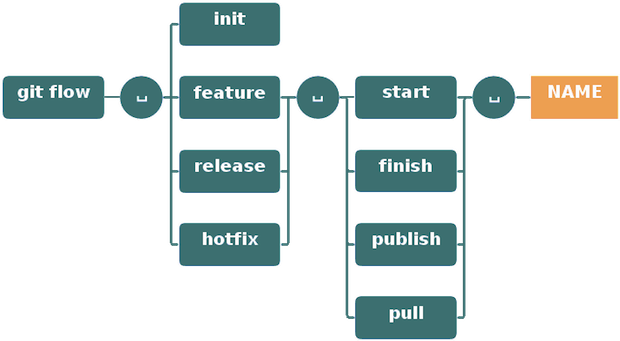| Useful Information This page has been generated by maven-confluence-plugin |
Table Of Contents
About
git-flow are a set of git extensions to provide high-level repository operations for Vincent Driessen's branching model. more
This cheatsheet shows the basic usage and effect of git-flow operations
Basic tips
Git flow provides excellent command line help and output. Read it carefully to see what's happening...
Git-flow is a merge based solution. It doesn't rebase feature branches.
Setup
You need a working git installation as prerequisite. Git flow works on OSX, Linux and Windows
For detailed git flow intallation instructions please visit the git flow wiki. |
OSX
Homebrew
$ brew install git-flow
Macports
$ port install git-flow
Linux
$ apt-get install git-flow
Windows (Cygwin)
$ wget -q -O - --no-check-certificate https://github.com/nvie/gitflow/raw/develop/contrib/gitflow-installer.sh | bash
You need wget and util-linux to install git-flow.
Getting started
Git flow needs to be initialized in order to customize your project setup.
Initialize
Start using git-flow by initializing it inside an existing git repository:
git flow init
You'll have to answer a few questions regarding the naming conventions for your branches.
It's recommended to use the default values.
Features
Develop new features for upcoming releases
Typically exist in developers repos only
Start a new feature
Development of new features starting from the 'develop' branch.
Start developing a new feature with
git flow feature start MYFEATURE
This action creates a new feature branch based on 'develop' and switches to it
Finish up a feature
Finish the development of a feature. This action performs the following
- Merged MYFEATURE into 'develop'
- Removes the feature branch
- Switches back to 'develop' branch
git flow feature finish MYFEATURE
Publish a feature
Are you developing a feature in collaboration? Publish a feature to the remote server so it can be used by other users.
git flow feature publish MYFEATURE
Getting a published feature
Get a feature published by another user.
git flow feature pull origin MYFEATURE
You can track a feature on origin by using
git flow feature track MYFEATURE
Make a release
Support preparation of a new production release. Allow for minor bug fixes and preparing meta-data for a release
Start a release
To start a release, use the git flow release command. It creates a release branch created from the 'develop' branch.
git flow release start RELEASE [BASE]
You can optionally supply a [BASE] commit sha-1 hash to start the release from. The commit must be on the 'develop' branch.
It's wise to publish the release branch after creating it to allow release commits by other developers. Do it similar to feature publishing with the command:
git flow release publish RELEASE
You can track a remote release with commandgit flow release track RELEASE |
Finish up a release
Finishing a release is one of the big steps in git branching. It performs several actions:
- Merges the release branch back into 'master'
- Tags the release with its name
- Back-merges the release into 'develop'
- Removes the release branch
git flow release finish RELEASE
Don't forget to push your tagsgit push --tags |
Hotfixes
Hotfixes arise from the necessity to act immediately upon an undesired state of a live production version
May be branched off from the corresponding tag on the master branch that marks the production version.
git flow hotfix start
Like the other git flow commands, a hotfix is started with
git flow hotfix start VERSION [BASENAME]
The version argument hereby marks the new hotfix release name. Optionally you can specify a basename to start from.
Finish a hotfix
By finishing a hotfix it gets merged back into develop and master. Additionally the master merge is tagged with the hotfix version.
git flow hotfix finish VERSION
Commands

| Backlog Not all available commands are covered here, only the most important ones |
